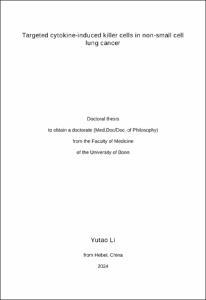Targeted cytokine-induced killer cells in non-small cell lung cancer

Targeted cytokine-induced killer cells in non-small cell lung cancer

| dc.contributor.advisor | Schmidt-Wolf, Ingo | |
| dc.contributor.author | Li, Yutao | |
| dc.date.accessioned | 2024-04-03T14:25:00Z | |
| dc.date.available | 2024-04-03T14:25:00Z | |
| dc.date.issued | 03.04.2024 | |
| dc.identifier.uri | https://hdl.handle.net/20.500.11811/11471 | |
| dc.description.abstract | STUDY I: A Combination of Cytokine-Induced Killer Cells With PD-1 Blockade and ALK Inhibitor Showed Substantial Intrinsic Variability Across Non-Small Cell Lung Background: Cancer heterogeneity poses a serious challenge concerning the toxicity and adverse effects of therapeutic inhibitors, especially when it comes to combinatorial therapies that involve more than one targeted inhibitor. In particular, in non-small cell lung cancer (NSCLC), a number of studies have reported synergistic effects of drug combinations in the preclinical models, while they were only partially successful in the clinical setup, suggesting those alternative clinical strategies (with genetic background and immune response) should be considered. Herein, we investigated the antitumor effect of cytokine-induced killer (CIK) cells in combination with nivolumab and crizotinib in vitro on NSCLC cell lines. Methods: We co-cultured the three genetically different NSCLC cell lines NCI-H2228 (EML4-ALK), A549 (KRAS mutation), and HCC-78 (ROS1 rearrangement) in the presence or absence of nivolumab and crizotinib. We profiled the variablity of surface expression multiple immune checkpoints, the concentration of absolute dead cell numbers, intracellular granzyme B on CIK cells by flow cytometry as well as mRNA by RT-qPCR. ELISA and western blot were applied to verify the activation of CIK cells. Results: Our analysis showed that, a) nivolumab significantly weakened PD-1 surface expression on CIK cells without impacting other immune checkpoints or PD-1 mRNA expression. b) this combination strategy showed an effective response on cell viability, IFN-γ production and intracellular release of granzyme B in CD3+ CD56+ CIK cells, but solely in NCI-H2228, c) the intrinsic expression of Fas ligand (FasL) as a T-cell activation marker in CIK cells was upregulated by this additive effect. d) nivolumab induced Foxp3 expression in CD4+CD25+ subpopulation of CIK cells significantly increased. Taken together, we could show that CIK cells in combination with crizotinib and nivolumab can enhance the anti-tumor immune response through FasL activation, leading to increased IFN-γ and granzyme B, but only in NCI-H2228 cells with EML4-ALK rearrangement. Therefore, we hypothesize that CIK therapy may be a potential alternative in NSCLC patients harboring EML4-ALK rearrangement, in addition, we support the idea that combination therapies offer significant potential when they are optimized on a patient-by-patient basis (Published in Front Oncol. 2022;12: 713476). | en |
| dc.description.abstract | STUDY II: Discovering single cannabidiol or synergistic antitumor effects of cannabidiol and cytokine-induced killer cells on non-small cell lung cancer cells A multitude of findings from cell cultures and animal studies are available to support the anti-cancer properties of cannabidiol (CBD). Since CBD acts on multiple molecular targets, its clinical adaptation, especially in combination with cancer immunotherapy regimen remains a serious concern. Considering this, we extensively studied the effect of CBD on the cytokine-induced killer (CIK) cell immunotherapy approach using multiple non-small cell lung cancer (NSCLC) cells harboring diverse genotypes. Our analysis showed that, a) The Transient Receptor Potential Cation Channel Subfamily V Member 2 (TRPV2) channel was intracellularly expressed both in NSCLC cells and CIK cells. b) A synergistic effect of CIK combined with CBD, resulted in a significant increase in tumor lysis and Interferon gamma (IFN-γ) production. c) CBD had a preference to elevate the CD25+CD69+ population and the CD62L-CD45RA+ terminal effector memory (EMRA) population in NKT-CIK cells, suggesting early-stage activation and effector memory differentiation in CD3+CD56+ CIK cells. Of interest, we observed that CBD enhanced the calcium influx, which was mediated by the TRPV2 channel and elevated phosphor-Extracellular signal-Regulated Kinase (p-ERK) expression directly in CIK cells, whereas ERK selective inhibitor FR180204 inhibited the increasing cytotoxic CIK ability induced by CBD. Further examinations revealed that CBD induced DNA double-strand breaks via upregulation of histone H2AX phosphorylation in NSCLC cells and the migration and invasion ability of NSCLC cells suppressed by CBD were rescued using the TRPV2 antagonist (Tranilast) in the absence of CIK cells. We further investigated the epigenetic effects of this synergy and found that adding CBD to CIK cells decreased the Long Interspersed Nuclear Element-1 (LINE-1) mRNA expression and the global DNA methylation level in NSCLC cells carrying KRAS mutation. Taken together, CBD holds a great potential for treating NSCLC with CIK cell immunotherapy. In addition, we utilized NSCLC with different driver mutations to investigate the efficacy of CBD. Our findings might provide evidence for CBD-personized treatment with NSCLC patients (Published in Frontiers in immunology, 2024, 15: 1268652). | en |
| dc.language.iso | eng | |
| dc.rights | In Copyright | |
| dc.rights.uri | http://rightsstatements.org/vocab/InC/1.0/ | |
| dc.subject.ddc | 610 Medizin, Gesundheit | |
| dc.title | Targeted cytokine-induced killer cells in non-small cell lung cancer | |
| dc.type | Dissertation oder Habilitation | |
| dc.identifier.doi | https://doi.org/10.48565/bonndoc-258 | |
| dc.publisher.name | Universitäts- und Landesbibliothek Bonn | |
| dc.publisher.location | Bonn | |
| dc.rights.accessRights | openAccess | |
| dc.identifier.urn | https://nbn-resolving.org/urn:nbn:de:hbz:5-75633 | |
| dc.relation.doi | https://doi.org/10.3389/fonc.2022.713476 | |
| dc.relation.doi | https://doi.org/10.3389/fimmu.2024.1268652 | |
| ulbbn.pubtype | Erstveröffentlichung | |
| ulbbnediss.affiliation.name | Rheinische Friedrich-Wilhelms-Universität Bonn | |
| ulbbnediss.affiliation.location | Bonn | |
| ulbbnediss.thesis.level | Dissertation | |
| ulbbnediss.dissID | 7563 | |
| ulbbnediss.date.accepted | 23.02.2024 | |
| ulbbnediss.institute | Medizinische Fakultät / Kliniken : Interdisziplinäre Zentren / Centrum für Integrierte Onkologie (CIO) | |
| ulbbnediss.fakultaet | Medizinische Fakultät | |
| dc.contributor.coReferee | Weiher, Hans | |
| ulbbnediss.contributor.orcid | https://orcid.org/0000-0002-0032-4940 |
Dateien zu dieser Ressource
Das Dokument erscheint in:
-
E-Dissertationen (2056)




